新概念二册第34课
新概念英语第二册lesson34课文

新概念英语第二册lesson34课文(实用版)目录一、背景介绍二、课文概述三、课文详细解读四、语法要点五、习题解答六、总结正文一、背景介绍新概念英语是一套著名的英语教材,被广泛应用于英语学习者中。
本文将分析新概念英语第二册第 34 课的课文。
二、课文概述本课文主要讲述了作者在一次观看戏剧时,因为身后的一对男女的私人谈话而感到烦恼,最终导致作者无法专心观看戏剧。
三、课文详细解读课文开头提到,“last week I went to the theatre”(上周我去了剧院),这个句子使用了过去时态,表明这个故事发生在过去。
接着,作者描述了自己的座位位置以及戏剧的吸引力,“I had a very goodseat.The play was very interesting.”(我的座位很好,戏剧很有趣)。
然后,作者提到了身后的一对男女,“a young man and a young woman were sitting behind me.”(一个年轻男子和一个年轻女子坐在我的身后),并描述了他们的谈话声音很大,“they were talking loudly.”(他们说话声音很大)。
因为这对男女的私人谈话,作者感到非常烦恼,“I was very angry.I couldn"t hear a word!”(我非常生气,一个字都听不见!),并转身与他们理论,“I turned round.I looked at the man and the woman angrily.”(我转身,生气地看着那个男人和女人),但他们并没有注意到作者的反应,“they didn"t notice.”(他们没有注意到)。
最后,作者再次转身,又一次表达了自己的不满,“I turned round again.I said, "I can"t hear a word!"”(我再次转身,说:“我听不见一个字!”),并且这次说话更加生气,“This is a private conversation!”(这是私人间的谈话!)。
新概念英语第二册34课作文答案

新概念英语第二册34课作文答案篇1New Concept English Book 2 Lesson 34作文答案1. Write a passage about your hometown.My HometownI come from a small town called Greenfield. It is situated in the countryside, surrounded by lush green fields and rolling hills. The town has a population of around 5,000 people, making it a close-knit community where everyone knows each other.One of the things that I love about my hometown is its peaceful atmosphere. The streets are quiet and clean, and there is hardly any traffic. The air is fresh and crisp, and you can often see the clear blue sky stretching out above you. It is a perfect place to relax and unwind after a long day.Greenfield also has a rich history, with many old buildings and landmarks scattered throughout the town. The town hall, built in the 18th century, is a beautiful example of Georgian architecture. There is also a quaint old church that dates back tothe medieval period. Walking through the town, you can sense the history and tradition that surrounds you.In terms of amenities, Greenfield has everything you need. There are several small shops and cafes where you can buy essentials or grab a bite to eat. There is also a small library and a community center where you can take part in various activities and events.Overall, I feel incredibly lucky to have grown up in such a beautiful and peaceful town. Greenfield will always hold a special place in my heart, and I hope to return to visit it often in the future.2. Write a passage about your favorite holiday destination.My Favorite Holiday DestinationOne of my favorite holiday destinations is a small beach town called Seaside Cove. Located on the coast, Seaside Cove boasts stunning views of the ocean and golden sandy beaches that stretch for miles. It is a paradise for beach lovers and nature enthusiasts alike.The town itself is charming, with colorful beach huts lining the promenade and quaint cafes and shops selling souvenirs and local delicacies. The atmosphere is laid-back and relaxed, makingit the perfect place to unwind and escape the hustle and bustle of everyday life.One of the highlights of Seaside Cove is its beautiful beach. The sand is soft and golden, and the water is crystal clear and inviting. You can spend hours sunbathing, swimming, or building sandcastles with your loved ones. In the evenings, you can take a leisurely stroll along the beach and watch the sun setting over the horizon, casting a golden glow over the ocean.For those who prefer a more active holiday, Seaside Cove offers a range of activities such as surfing, kayaking, and hiking along the stunning coastal cliffs. You can also take a boat trip to explore the nearby islands and spot dolphins and seals in their natural habitat.Overall, Seaside Cove is a hidden gem that offers the perfect combination of natural beauty, tranquility, and adventure. It is a place that I will always hold close to my heart, and I cannot wait to return and create more wonderful memories in the future.篇2New Concept English Book Second Book Lesson 34: Writing AnswerRecently I read a book called "The Call of the Wild" by Jack London and I found it extremely captivating. The story follows a dog named Buck who is stolen from his comfortable home in California and taken to the Yukon territory during the gold rush. Throughout the novel, Buck faces numerous challenges and learns to survive in the harsh wilderness.One aspect of the book that I found particularly interesting was the way that London portrays the relationship between humans and animals. Buck is subjected to both kindness and cruelty from his various owners, which highlights the complexity of the human-animal bond. London also explores the idea of the "call of the wild," which refers to the primal instincts that lie dormant within all creatures.Another theme that resonated with me was the concept of survival of the fittest. Buck must learn to adapt to his new environment and fend for himself in order to survive. This theme is a central aspect of the novel and serves as a powerful reminder of the harsh realities of the natural world.Overall, "The Call of the Wild" is a thought-provoking and stirring novel that explores themes of survival, loyalty, and the bonds that connect all living creatures. I highly recommend thisbook to anyone looking for a gripping and emotionally resonant read.In conclusion, "The Call of the Wild" is a timeless classic that continues to resonate with readers of all ages. London's vivid descriptions and compelling characters make this novel amust-read for anyone interested in the human-animal bond and the power of the natural world.篇3New Concept English 2 Lesson 34 Composition AnswerIn this lesson, we have learned about how to express possession in English using 's or of. In English, there are different ways to show possession depending on the situation.For example, we use 's to show possession when we are talking about people or animals. For example, "John's book" means that the book belongs to John. We can also use 's with a possessive pronoun, such as "my sister's car" or "their teacher's office".When we are talking about things or group of people, we usually use of to show possession. For example, "the car of my friend" or "the capital of France".In addition, we can use an apostrophe without an s to show possession when we are talking about plural nouns ending in s. For example, "the students' books".Overall, understanding how to express possession in English is important for effective communication. It helps to clarify who or what owns something and adds more information to a sentence.In conclusion, learning how to express possession using 's or of in English can help us to communicate more clearly and effectively. By practicing and using these rules in our writing and speaking, we can improve our language skills and become more proficient in English.。
(完整版)新概念英语第二册课件(Lesson-34-Quick-work)

★ most [ məust ] ad. 最;相当,非常 e.g. the most important discoveries a most interesting movie
worry ['wʌri] ['wɜ:ri] adj.表示“焦虑的”、“担心的” e.g.: She’s worry. vt. 表示“使担心/发愁” e.g.: Nothing worries me vi.表示“忧虑,担心” e.g.: She appears to be worried about
wonder= want to know wonder whether/if/who/when/where/what/why
+ 从句”
她想知道那个孩子在干吗。 She wondered what the child was doing. 我想知道他来不来。 I wonder whether/if he will come.
一只睡着的狗 a sleeping dog
一张焦虑的脸 a worried face
• Five days ago, the policeman told him, the bicycle was picked up in a small village four hundred miles away.
accept &receive? 他已经接受了我们的邀请。
He has accepted our invitation. 我没有收到你的传真。
I didn’t receive your fax. accept: 强调主动地或自愿地接受,或者说,经过考虑后同意
接受。
receive: 着重仅仅接到或收到这一结论或事实,而不含采取主 动或积极行动的意思。
新概念第二册 Lesson 34课件
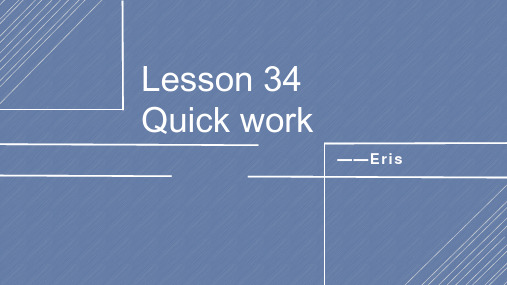
课文分析
【2】Last Tuesday he received a letter from the local police.
★local adj. 当地的,本地的
local news 当地新闻 local color 地方特色 local people 当地人
native ['neɪtɪv] n. 土著人 adj. 土生土长的
【练一练】 这是这个家庭最有趣的照片。 This is the most interesting photo of the family.
单词讲解
many和much的最高级 many--more--most much--more--most most绝大多数的(前面不加冠词)
例:大多数的男孩喜欢足球。 Most of the boys like football. 【练一练】:他们中的大多数都迟到了。 Most of them were late.
She wondered who that man was/ what had happened. 她想知道那个人是谁/到底发生了什么事。
She wondered what the child was doing. 她想知道那个孩子在干吗。
I wonder whether/if he will come. 我想知道他来不来。
For some reason, they called off the party.
【练一练】开始下雨了所以我们取消了比赛。
It began to rain so we called off the match.
【练一练】
1. I called _o_n__ you five times yesterday. Were you out?
新概念英语第二册34课PPT课件

3. In the letter he was asked to call at the station.
call at: (对某地)拜访 He calls at every house in the street once a month.
call on :探望(某人);号召 你最近去看过乔治吗? Have you called on George recently? 校长号召学生们更努力地学习。 The headmaster called on the students to work harder.
call out :大声叫喊 Some people on the bank called out to the man in
the boat.
call sb. up: 打电话给某人 她将在明天给你打电话。 She'll call you up tomorrow.
call off: 取消 天开始下雨,所以我们取消了比赛。 It began to rain so we called off the match.
9. He was amused too, because he never expected the bicycle to be found.
amuse vt. 娱乐;消遣;使发笑;使愉快
大家听了关于那只狗的故事都笑起来了。
Everyone was amused at/by the story about the dog.
1. Dan Robinson has been worried all week. be worried about=worry about worry & worry about
Tony is worried about his students. Tony worries about his students. Tony worries his students.
逐句精讲新概念英语第二册:第34课破案“神速”
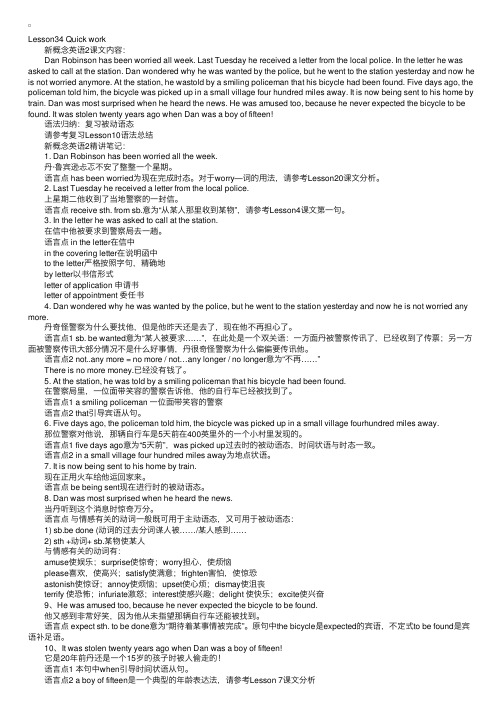
另一方面被警察传讯大部分情况不是什么好事情丹很奇怪警察为什么偏偏要传讯他
Lesson34 Quick work 新概念英语2课文内容: Dan Robinson has been worried all week. Last Tuesday he received a letter from the local police. In the letter he was asked to call at the station. Dan wondered why he was wanted by the police, but he went to the station yesterday and now he is not worried anymore. At the station, he wastold by a smiling policeman that his bicycle had been found. Five days ago, the policeman told him, the bicycle was picked up in a small village four hundred miles away. It is now being sent to his home by train. Dan was most surprised when he heard the news. He was amused too, because he never expected the bicycle to be found. It was stolen twenty years ago when Dan was a boy of fifteen! 语法归纳:复习被动语态
语言点1 a smiling policeman 一位面带笑容的警察 语言点2 that引导宾语从句。 6. Five days ago, the policeman told him, the bicycle was picked up in a small village fourhundred miles away. 那位警察对他说,那辆自行车是5天前在400英里外的一个小村里发现的。 语言点1 five days ago意为“5天前”,was picked up过去时的被动语态,时间状语与时态一致。 语言点2 in a small village four hundred miles away为地点状语。 7. It is now being sent to his home by train. 现在正用火车给他运回家来。
新概念2第34课
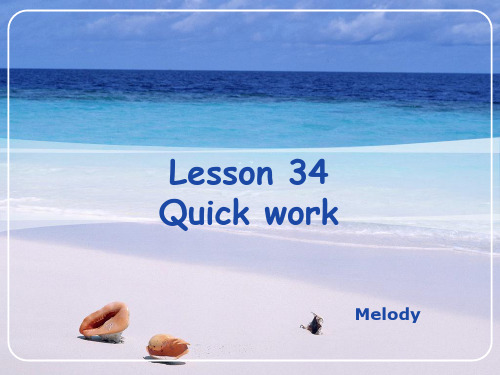
1)n.(政府机关等)局、所、中心:供应站; (广播)电台 a police station 警察局a fire station 消防局 a power station 供电局 TV station 电视台
2)n.车站 A rail way station 火车站 站 A bus station 汽车
作将于三小时后完成。 The baby must be looked after well. 这孩子必须被好好照顾。
Text Explanation
Dan Robinson has been worried all week. 1.现在完成时表示过去一直延续到现在,并有可能继 续延续下去的动作。 2.be worried about sth 对…感到担心 3.all all all all week 整整一个星期 day long 整整一天 year round 整年 day and all night 整日整夜
Text Explanation
It was stolen twenty years ago when Dan was a boy of fifteen!
1.rob 与 steal 的用法区别 1) 从意思上看: rob 指公开地“抢”、“夺”(通常使用暴力); 而 steal 则指在人们不防备或不在场的情况下悄悄地“偷”。 2)从结构上看,两句所使用的句型完全不同 rob+被抢的人或地方+of+被抢的东西 steal+被偷走的东西+from+某人或某地
Text Explanation
It is now being sent to his home by train.
by by by by by train 坐火车 bus 坐公共汽车 road 通过陆路 sea 通过水路 air 通过飞机
新概念英语第二册第34课课文
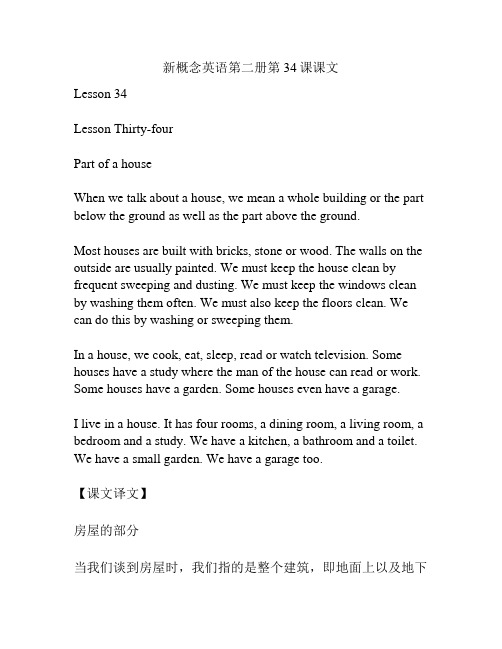
新概念英语第二册第34课课文Lesson 34Lesson Thirty-fourPart of a houseWhen we talk about a house, we mean a whole building or the part below the ground as well as the part above the ground.Most houses are built with bricks, stone or wood. The walls on the outside are usually painted. We must keep the house clean by frequent sweeping and dusting. We must keep the windows clean by washing them often. We must also keep the floors clean. We can do this by washing or sweeping them.In a house, we cook, eat, sleep, read or watch television. Some houses have a study where the man of the house can read or work. Some houses have a garden. Some houses even have a garage.I live in a house. It has four rooms, a dining room, a living room, a bedroom and a study. We have a kitchen, a bathroom and a toilet. We have a small garden. We have a garage too.【课文译文】房屋的部分当我们谈到房屋时,我们指的是整个建筑,即地面上以及地下的部分。
新概念2第34课
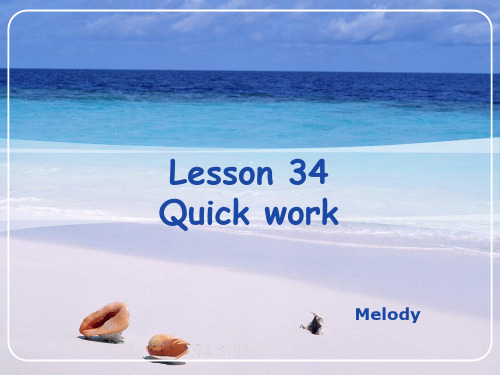
被动语态基本结构:be+ every The classroom is cleaned P.P day. 一般现在时: am 教室每天被打扫built in are +P.P This bridge was / is / 1969. 一般过去时: was / were +P.P 这座桥是1969年建成的。repaired now. The broken bike is being
New words and expressions
station
1)n.(政府机关等)局、所、中心:供应站;(广 播)电台 a police station 警察局 a fire station 消防局 a power station 供电局 TV station 电视台 a filling station / a filling gas station 加油站 a broadcasting station 广播电台 eg: The pickpocket was brought to the nearby police station. I don't like the programme, what's on the other station?
Detective: Di Ren jie A real person in history, who was in charge of judicature in Tang Dynasty. Solved 18000 cases in a year, which mignt be the reason why he was admired as a competent detective.
Detective:Song Ci, in Song Dynasty Considered the first professional medical examiner(法医) in the world. Started the unique skill of dissecting(解剖) dead bodies that helped him slove some most difficult cases.
新概念英语第二册第34课-quick work

新概念英语第二册第34课:quick workLesson 34 quick work破案“神速”First listen and then answer the question.听录音,然后回答以下问题。
How long had the police taken to find his bicycle?Dan Robinson has been worried all week.丹.鲁宾逊焦虑了整整一个星期。
Last Tuesday he received a letter from the local police. In the letter he was asked to call at the station.上星期二他收到当地警察局的一封信,要他到警察局去一趟。
Dan wondered why he was wanted by the police, but he went to the station yesterday and now he is not worried anymore.丹奇怪警察为什么找他,但昨天还是去了,结果他不再担心了。
At the station, he was told by a smiling policeman that his bicycle had been found.在警察局里,一位面带笑容的警察告诉他,他的自行车找到了。
Five days ago, the policeman told him, the bicycle was picked up in a small village four hundred miles away.那位警察对他说,那辆自行车是5天前在400英里外的一个小村里发现的It is now being sent to his home by train. Dan was most surprised when he heard the news. He was amused too,现在正用火车给他运回家来。
新概念2第34课
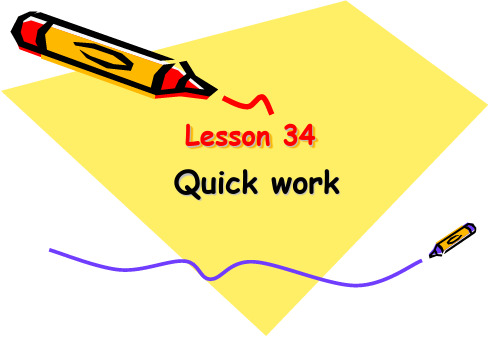
reccaelilveo:u强t (调to客) 观大接声收叫,而喊不含采取主动或积极行动
calDl a(snb.R的)obu意pin思so。n给h某as人b打ee电n 话wo(美rr语ied) all week.
calLl aosftf Tuesda取y 消he(某re项ce活iv动ed) a letter from the local
大声叫喊
⑤ call off
取消(某项活动)
⑥ call in
召集
I live in the house five miles away。
pick up a) 拎起,拾起,捡起
电话铃一响,我就拿起了话筒。
I picked up the receiver as soon as the phone rang. b) (用)车接(人或物);车辆(中途)搭(人)
我来办公室接你。
Lesson 34
Quick work
Words
nat•ivwe oanddje.本r 国v的. ,想本知地的道 n.本地人;土著人 • local adj. 地方性的,当地的,本地的 • station n. (警察)局
①见解a••d等mav).m非osu常ts,e 很a(d相v.v当.娱相于v乐当er;,y使非,但发常通常笑用,使于表愉达快主观感情、
bicycle was picked
tuhpeinpoalicsemmaall<n vNtiloolatldegeh4if>mo,urthe
hundred miles away.
3.pick up (偶然地、意外地)找到、获得、学会 <Note 5>
five miles away这一类结构可以直接 作定语,放 在被修饰词后面。
新概念英语第二册第34课Quick work 破案神速

Quick Work
Nice to meet you!
Tell me about yourself.
•Did you do anything special on your winter vacation?
•Have you ever been to a police station? • Have you been on the scene of a crime?
• Considered the first professional medical examiner (法医) in the world.
• Comprehended the unique skill of dissecting (解剖) dead bodies that helped him solve some most difficult cases.
Dan Robinson has been worried all week. Last Tuesday he received a letter from the local police, in which he was asked to call at the station. He was wanted by the police, which made him puzzled. He went to the station yesterday and now he is not worried anymore. At the station he met a smiling policeman who told him, “Your bicycle has been found.” Five days ago, the policeman told him, the bicycle was picked up in a small village (which was) four hundred miles away. It is now being sent to his home by train. Dan was most surprised when he heard the news about the bicycle, which was lost in the year when he was a boy of fifteen. But was it found in the same place as he lost it?!
新概念英语第二册课件Lesson34(共14页)

Lesson 34 Quick work
The bicycle was picked up in a small village four hundred miles away.
Lesson 34 Quick work
Dan wondered why he was wanted by the police, but he went to the station yesterday and now he is not worried any more.
wonder v. (want to know)
Lesson 34 Quick work
Dan wondered why he was wanted by the police, but he went to the station yesterday and now he is not worried any more.
wonder: +at/ about 感到惊讶,感到奇怪
a sleeping dog a flying bird a crying baby
Five days ago, the policeman told him, the bicycle was picked up in a small village four hundred miles away.
The door will be opened by me.
Lesson 34 Quick work
新概念英语第二册lesson34课文
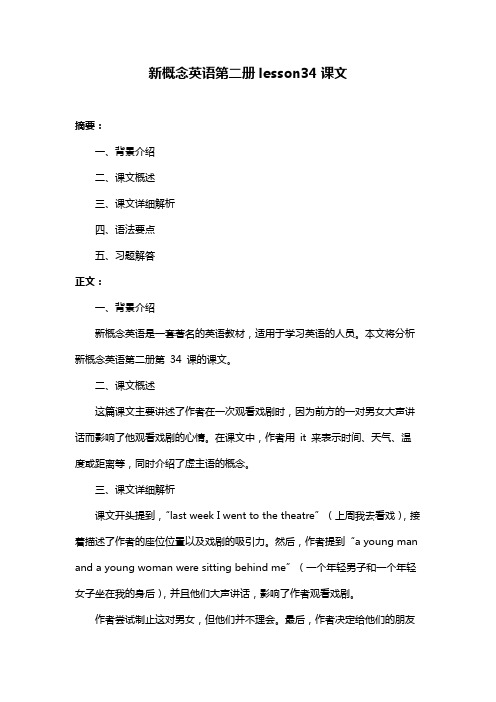
新概念英语第二册lesson34课文
摘要:
一、背景介绍
二、课文概述
三、课文详细解析
四、语法要点
五、习题解答
正文:
一、背景介绍
新概念英语是一套著名的英语教材,适用于学习英语的人员。
本文将分析新概念英语第二册第34 课的课文。
二、课文概述
这篇课文主要讲述了作者在一次观看戏剧时,因为前方的一对男女大声讲话而影响了他观看戏剧的心情。
在课文中,作者用it 来表示时间、天气、温度或距离等,同时介绍了虚主语的概念。
三、课文详细解析
课文开头提到,“last week I went to the theatre”(上周我去看戏),接着描述了作者的座位位置以及戏剧的吸引力。
然后,作者提到“a young man and a young woman were sitting behind me”(一个年轻男子和一个年轻女子坐在我的身后),并且他们大声讲话,影响了作者观看戏剧。
作者尝试制止这对男女,但他们并不理会。
最后,作者决定给他们的朋友
写明信片,但由于某种原因,没有写成。
四、语法要点
1.it 的用法:it 常常用来表示时间、天气、温度或距离等,例如“it was Sunday”(那是个星期天)。
2.虚主语:虚主语是没有实际意义的主语,它之所以存在,是因为英语句子必须包含主语和谓语。
例如“it was raining again”(又下雨了),其中的it 就是虚主语。
五、习题解答
1.根据课文最后两句话,可以判断出作者作出的一项重大决定是给他的朋友们写明信片,但最终没有写成,所以答案是a。
新概念英语第二册 第34课
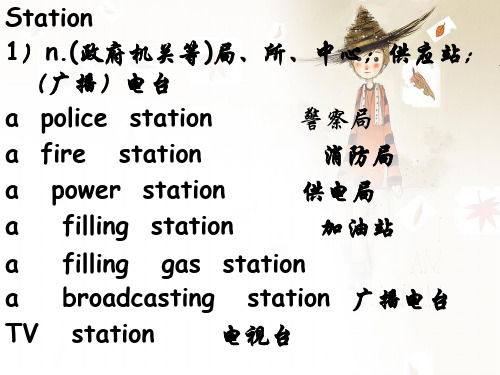
4.They have found your wallet. →Your wallet has been found. 5.He never expected them to find the bicycle. →He never excepted the bicycle to be found.
2)(身体上)局部性的 a local pain 局部疼痛 3) a local line 支线(美) a local train (火车的)普通 列车
与call有关的短语: (1) call at (= visit ) 表示“到…去, 拜访”,后跟某个地点场所: (2) call on (=pay a visit) 表示 “拜访,访问”,后接某个人: (3) call out to (=shout / cry to ) 大声喊 (4) call up (=telephone) 给...打 电话 (5) call off (=cancel ) 取消
Dan wondered why he was wanted by the police, but he went to the station yesterday and now he is not worried anymore. Wonder v.疑惑,想知道 wonder这个词表示推断时,后面只能跟由疑问词 引导的宾语从句,即“wonder whether/if/who/when/where/what/why + 从 句” Why引导宾语从句,采用正常陈述语序 *宾语从句需注意语序, 虽然从句表述的实质上是 个问题,但从句的语序仍是陈述句的语序。
Dan Robinson has been worried all week. 现在完成时表示从过去一直延续到现 在,有可能继续延续下去的动作 be worried about sth.对某事感到担心 be anxious about sth.对某事感到焦 虑 all week整星期 all day long整天 all year round整年
- 1、下载文档前请自行甄别文档内容的完整性,平台不提供额外的编辑、内容补充、找答案等附加服务。
- 2、"仅部分预览"的文档,不可在线预览部分如存在完整性等问题,可反馈申请退款(可完整预览的文档不适用该条件!)。
- 3、如文档侵犯您的权益,请联系客服反馈,我们会尽快为您处理(人工客服工作时间:9:00-18:30)。
It was stolen twenty years ago when Dan was a boy of fifteen!
一般过去时的被动语态: was/were+p.p.
1.be worried/ amused/ surprised/ pleased/ satisfied/frightened/interested/excited …
At the station, he was told by a smiling policeman that his bicycle had been found.
Five da偶pyi然csk发aupg现o, the policeman told him, the bicycle was picked up in a small village four hundred miles away.
复习时态构成:
Quick work
quick: 动作的快 fast: 速度的快 soon: 时间快 have a quick freeze速冻
New words
station ['steiʃən] n. (警察)局;车站
a police ~ 警察局 a fire ~ 消防队; a power ~ 发电站; a railway ~ 火车站; a bus ~ 公共汽车站;
most [məust]
adv. 相当,非常(前不加the修饰adj.) 最,最多(前加the构成最高级)
most 与 very 的区别: most表示主观见解, e.g. He is most kind to me. very 指客观表述 e.g. He is very tall.
have\has played with a cat
现在进行时的被动语态,
其结构为“am/is/are+ being+p.p.”
It is now being sent to his
home by train. Dan was most
surprised when he heard the
news.
hear(heard,heard) 听见
He was amused too, because he never expected the bicycle to be found.
have\has skated in winter
have\
Listen to the tape and then answer these questions.
Where did he go yesterday ?
He went to the station yesterday.
1.How long had the police taken to find his bicycle?
2. Was Dan worried or not when he received a letter from the police? Why?
3. What did Dan feel when he heard the news?
2. receive / get / have a letter from / hear from 3. be asked / told / expected /ordered/
allowed / encouraged/ invited/ advised to do sth. 4. call 有关词组 5. most = very 6. be wanted by a wanted man 一名通缉犯 7. wonder+ 疑问词引导的宾语从句
3. The bicycle is now being ____s_e_n_t_ to his home __b_y__t_r_a_in____.
4. The bicycle was ___s_t_o_le_n__ twenty
years ago when Dan was___a_b_o_y__o_f_f_i_f_te_e_n_______.
Dan wondered why he was wanted bstyatthioenpyoelsicteen,robdtua..t.ya=nhanyenomdwmonreoeonrwet不th再oe.t.i.hsenot worried anymore.
过去完成时的被动语态
构成:had been + p.p
• 狄仁杰 ——断案如神的唐朝侦探 • 包拯 ——屡破奇案的“青天” • 宋慈 ——大宋提刑官 • 福尔摩斯 ——爱叼烟斗的真相派
Dan Robinson has been worried all week.
= for the whole week
Last T整u整e一sd周ay he received a letter frreocmeivteh/ehalovec/aglet a letter from sb. police. =hear from sb.
1.His bicycle had been ____f_ou_n_d_______.
2. Five days ago, his bicycle was __p_ic_k_e_d_u_p____ in a small village _f_o_u_r_h_u_n_d_r_e_d__m_il_e_s_a_w_a_y______.
My bicycle was s________ twenty years ago and I never e_______ that my bicycle could be found. Last Tuesday I received a letter from the local police. I had been made w______ all week because I was asked in the letter to c______ at the station. I w_______ why the police wanted me, but I went to the station yesterday and now I am not afraid anymore. At the station, a smiling policeman told me that my bicycle had been found. Five days ago, the bicycle was p______ up in a small village four hundred miles a _________. It is now b_________ sent to my home by t________. I was m______ surprised to hear the news and I was a ________, too.
收到...的来信
In the letter he was asked to call at the station.
主动语态:caasllkastb.stpo. d参o 观sth/.要去求某某地人做某事 被动语态:scb.ablle oansksedb.to拜do访st某h.某人人被要求做某事
e.g. He asked me to answer the question. => I was asked to answer the question.
